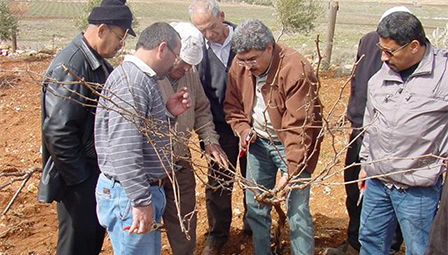

Funded by the Lebanese Ministry of Agriculture and a philanthropic
group of Mexicans of Lebanese Origins, this project will run from 2006 to 2012, serving communities in South Lebanon.
The YMCA is currently working to rehabilitate 3 agricultural extension centers in South Lebanon to improve their services in the wake of the July 2006 war. In October 2009, the contract between the YMCA and the Ministry of Agriculture was renewed for 3 years to run the technical centers for the following purposes:

Funded by the Jinishian Memorial Program from 2009 to 2010,
the YMCA organized a vocational training program on 3 different topics:
• Soap making
• Candle making
• Floral arrangements (natural and artificial).
The objective was to improve family incomes for a group of 25 Armenian women. The YMCA developed the training materials in order to cover 27 training days.
The Rural Development and Agriculture Program is active on a national level, engaging farmers, food production cooperatives, students, consultants and government officials on a daily basis.
The various programs works closely with the Vocational Training Department to provide new agricultural techniques that improve the livelihoods of rural communities. The department promotes methods that protect the environment and create more sustainable means of food production for Lebanon and beyond.
• Improve and develop the management of the centers by
activating partnerships between them and the local community.
• Reduce the agricultural cost of production by training the farmers
on new techniques of production.
• Improve the production of olive oil and honey in both
the quantity and the quality.
Funded by the Minstry of Foreign Affairs of Finland through the Rural Women Advisory Organization, this one year project benefitted 17 agriculture cooperatives in dry areas prone to desertification
This project comes in the context of the United Nations Convention to Combat Desertification, to sustainably develop lands at risk of desertification by providing markets for products from these areas as a means to increasing income and supporting local economies. The project targets women’s groups in the deserted areas and includes trainings on the manufacturing of products, accommodation of the women’s center with the necessary equipment for the production, and marketing assistance.

Funded by the World Bank, European Union, Cpuncil for Development and Reconstruction, and Danish Refugee Council, this small project covered the physical rehabilitation and restoration of 13 agricultural cooperatives, owned and operated by women, that were affected by the 2006 war.